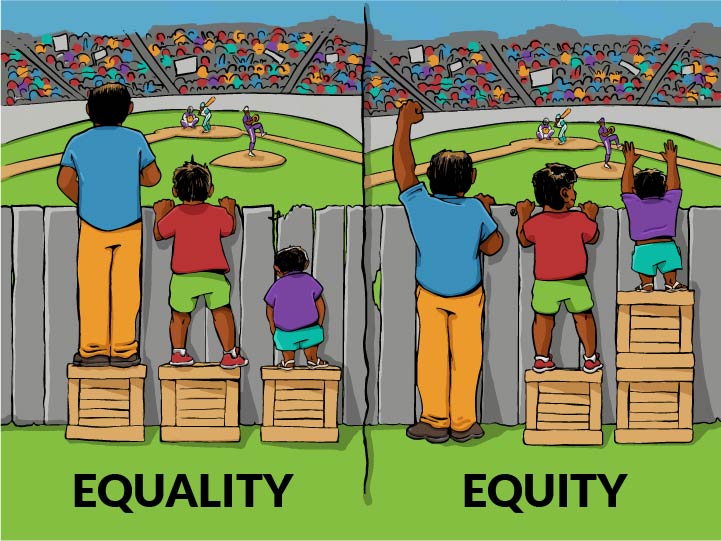Written by: Marc Gorelick, MD, president and CEO of Children’s Minnesota, on his Starting with Curious blog.
Last week marked the one-year anniversary of the murder of George Floyd. After the initial shock of his brutal killing, captured on video, and the subsequent global protests against police brutality in particular and widespread racism in general, there seemed to be a change in the air. White people, including business and political leaders, were openly using phrases such as “white supremacy” and “systemic racism” for the first time I can recall. They went beyond the usual offering of thoughts and prayers, making commitments to real change. Granted, actions matter more than words, but at least the words finally seemed to acknowledge the depth and extent of oppression of Blacks and other people of color. Equity became the watchword of the day.
That in itself, in a way, represented an advance in how we talked about things. Earlier generations fighting for civil rights tended to talk about equality. Just treat everyone the same. But in the wake of centuries of the accumulated effects of unequal treatment, it makes more sense to think about equity. If equality is treating everyone the same, equity is treating everyone in a way that is based on their need.

Many of us have seen the cartoon depiction:

And here we are, just one year later, and hope is fading fast. The New York Times, for example, recently documented the sharp decline in support for the Black Lives Matter movement among whites, to levels significantly lower than before Floyd’s murder. Voter suppression laws likely to disproportionately affect BIPOC voters are spreading faster than kudzu across the South. And even as Derek Chauvin was being tried in Minneapolis for the murder of George Floyd, an officer in nearby Brooklyn Center was being charged in the killing of Daunte Wright.
It isn’t just that the talk hasn’t translated into action. In many quarters, the very concept of equity is being portrayed as itself discriminatory and somehow un-American. Here is an example from the libertarian magazine Reason, commenting on Vice President Kamala Harris drawing a distinction between equality and equity:
“For decades, these two divergent philosophical and public policy concepts were represented by a battle over adjectival phrases. Should we strive for equality of opportunity, or equality of outcome? Though intellectual and political enthusiasm for the outcomes-based approach did have some high-water moments in the 1970s, the long twilight struggle against 20th century totalitarianism produced a rough if sometimes reluctant governing consensus that states powerful enough to promise economic and racial parity were far more likely to produce mass immiseration. Striving for equality under the law—removing legal discrimination by government—was less ambitious, but more doable.”
The author makes two claims: first, that proponents of equity are actually striving to achieve equality of outcomes for all (which he portrays as vaguely foreign and socialist), when the real goal should be equality of opportunity; and second, that equality under the law is sufficient to guarantee it. Both of these are incorrect.
Let me start with the second. Unequal treatment of Blacks, other people of color, LGBTQ individuals, and others does not depend on a government stamp of approval. Segregation in the South, enshrined in law, was equaled by or even surpassed by that achieved in the North despite the lack of “legal discrimination by government” there. Discriminatory lending by banks, discriminatory hiring practices by companies and unions, and discriminatory treatment by teachers, retailers, and police have produced as much social and economic misery for Blacks as Jim Crow laws. Simply removing officially sanctioned racism has not and will not produce equal opportunity.
Equity refers to true equality of opportunity. It means identifying not only legal but other barriers that BIPOC individuals face as the result of centuries of racist laws and other practices, and addressing those barriers. I’ll use the example of the COVID vaccine. There are no legal barriers that impede access to the vaccine based on race. However, there are numerous other barriers, including location of health facilities, availability of transportation, and access to information about the vaccine. Equitable vaccine access would mean targeted outreach and resources to overcome these barriers. It’s the equivalent of providing a second box to be able to see over the fence.
Even true equality of opportunity – equitable opportunity – does not guarantee equality of outcomes for each individual. I’m not sure that would even be desirable – after all, we are all individuals and wouldn’t want to be exactly the same. Moreover, there is a need to account for individual effort, desire, etc. To go back to the cartoon, the person getting the two boxes might not be interested in the game. She may choose to use the wood from the boxes to build a lemonade stand. She may even sell the boxes to someone else and use the money to buy a ticket to get into the ballpark! The point isn’t that every single person is ultimately going to watch the game from behind the fence. It’s that anyone who has the desire and is willing to put in an equal effort to do so will not be prevented from doing it due to factors outside their control.
So, while equity does not mean every individual has exactly the same outcome, it should, if done right, lead to equality of outcomes across groups. Differences in effort and desire should even out, and the results should be roughly similar when examined over populations. To use the vaccine equity example, equitable vaccine access does not mean that every person is vaccinated. It means that when we look at groups in the population, the rates of vaccination should be the same.
And that is why when we see disparities in high school graduation rates, or home ownership, or vaccinations, we conclude there is inequity. But that is not because of some nefarious totalitarian goal of imposing uniformity on everyone. If we could quantify the accumulated effects of systemic and structural racism, we could perhaps precisely define and measure opportunity and determine if we have achieved equity in those opportunities. I’m not entirely sure how one would do that. How much vaccine outreach is enough? Given the inability to measure the desired goal – equitable opportunity – we use disparity in outcomes across groups as a proxy measure for whether there was equitable opportunity to achieve those outcomes.
Equity is not a dirty word. It is not un-American. I would argue it was part of the basis of our founding. The Declaration of Independence states, “We hold these truths to be self-evident, that all men [sic] are created equal, that they are endowed by their Creator with certain unalienable Rights, that among these are Life, Liberty and the pursuit of Happiness.” We don’t all have the right to be happy, but we all have the same right to pursue that happiness. That’s equity. We haven’t lived up to that ideal in the centuries since that document was written, but we shouldn’t give up on trying.